
Animal Camel Desert Resting Tranquil Solitude Concept
Page Description
A reminder that it is important to pay attention to the cumulative effects of small events or factors, as they can have a significant impact in the long run
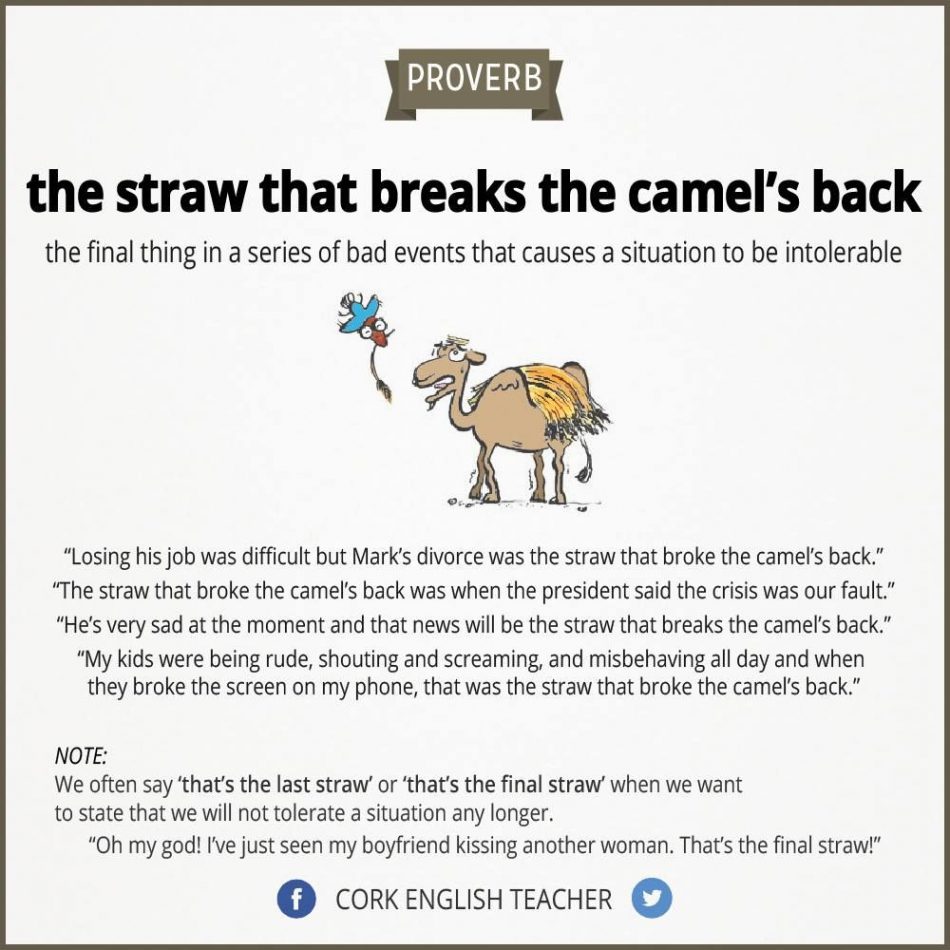
the last in a series of unpleasant events that finally makes you feel that you cannot continue to accept a bad situation:
Losing my job was bad enough, but being evicted was the final straw.
She’s always been rude to me, but it was the last straw when she started insulting my mother.
Cambridge Dictionary
The English equivalent expression for the Dutch saying
“de druppel die de emmer doet overlopen” is
“the straw that broke the camel’s back.“
Both phrases convey the idea that a seemingly small or insignificant event, the final drop or straw, leads to a larger, often negative, consequence or reaction.
When Injustice Becomes Too Heavy to Bear
The Straw that Breaks the Camel’s Back
Sometimes, a single event exposes the breaking point of a system already burdened by injustice. This page delves into the meaning of the saying “the straw that breaks the camel’s back,” illustrating how cumulative failures can lead to catastrophic outcomes.
Through text, imagery, and two powerful videos, we explore how the Post Office scandal became a defining example of such a breaking point.
- In Post Office Scandal – The Tour, Nick Wallis and Tony Downey share firsthand insights into the human cost of the Horizon IT disaster and the pursuit of justice.
- In “Can’t Believe This Is True”, actor Will Mellor recounts the emotional toll of portraying a victim of the scandal, shedding light on the devastating impact of institutional failures.
Together, these stories reveal how the weight of persistent wrongdoing can ultimately collapse even the most trusted institutions.
Wanneer onrecht ondragelijk is
Soms onthult één enkele gebeurtenis het breekpunt van een systeem dat al bezwijkt onder de last van onrecht.
Deze pagina gaat dieper in op de betekenis van de uitdrukking “de druppel die de emmer doet overlopen” en laat zien hoe opeenstapelende fouten kunnen leiden tot rampzalige gevolgen.
Aan de hand van tekst, beelden en twee krachtige video’s onderzoeken we hoe het Post Office-schandaal een schoolvoorbeeld werd van zo’n breekpunt.
- In Post Office Scandal – The Tour delen Nick Wallis en Tony Downey uit de eerste hand inzichten over de menselijke tol van de Horizon-IT-ramp en de strijd voor gerechtigheid.
- In Can’t Believe This Is True vertelt acteur Will Mellor over de emotionele impact van het vertolken van een slachtoffer van het schandaal en werpt hij licht op de verwoestende gevolgen van institutioneel falen.
Samen onthullen deze verhalen hoe de last van aanhoudend onrecht uiteindelijk zelfs de meest vertrouwde instellingen kan laten instorten.
“The straw that breaks the camel’s back” is a popular idiom that is used to describe a situation where a small or seemingly insignificant event or factor causes a larger, more significant outcome or consequence. The key points of this idiom can be summarized as follows:
Cumulative effect: The idiom implies that there is a cumulative effect of small, often unnoticed events or factors that gradually build up over time, and eventually lead to a tipping point or a breaking point.
Overload: The camel’s back represents a threshold or limit beyond which a burden or load becomes too heavy to bear. The idiom suggests that the cumulative effect of smaller burdens becomes overwhelming and causes the final, decisive event or factor to trigger a negative outcome.
Unpredictability: The triggering event or factor is often unexpected or seemingly minor, and may not be directly proportional to the overall burden or load. It could be a seemingly insignificant event that, in combination with the existing burdens, causes a sudden and unexpected collapse or failure.
Context-dependent: The idiom is used in various contexts, including personal, social, political, and economic situations. It can refer to a wide range of scenarios, such as stress, pressure, responsibilities, problems, or challenges, where a seemingly small event or factor leads to a significant outcome.
Warning: The idiom serves as a cautionary reminder that it is important to pay attention to and manage the cumulative effects of small events or factors, as they can have a significant impact in the long run. It underscores the idea that seemingly minor issues should not be ignored, as they may eventually contribute to a larger problem.
In summary, “the straw that breaks the camel’s back” conveys the idea of a small event or factor causing a significant outcome due to the cumulative effect of smaller burdens or loads. It emphasizes the importance of being mindful of seemingly minor issues and managing them to prevent negative consequences.
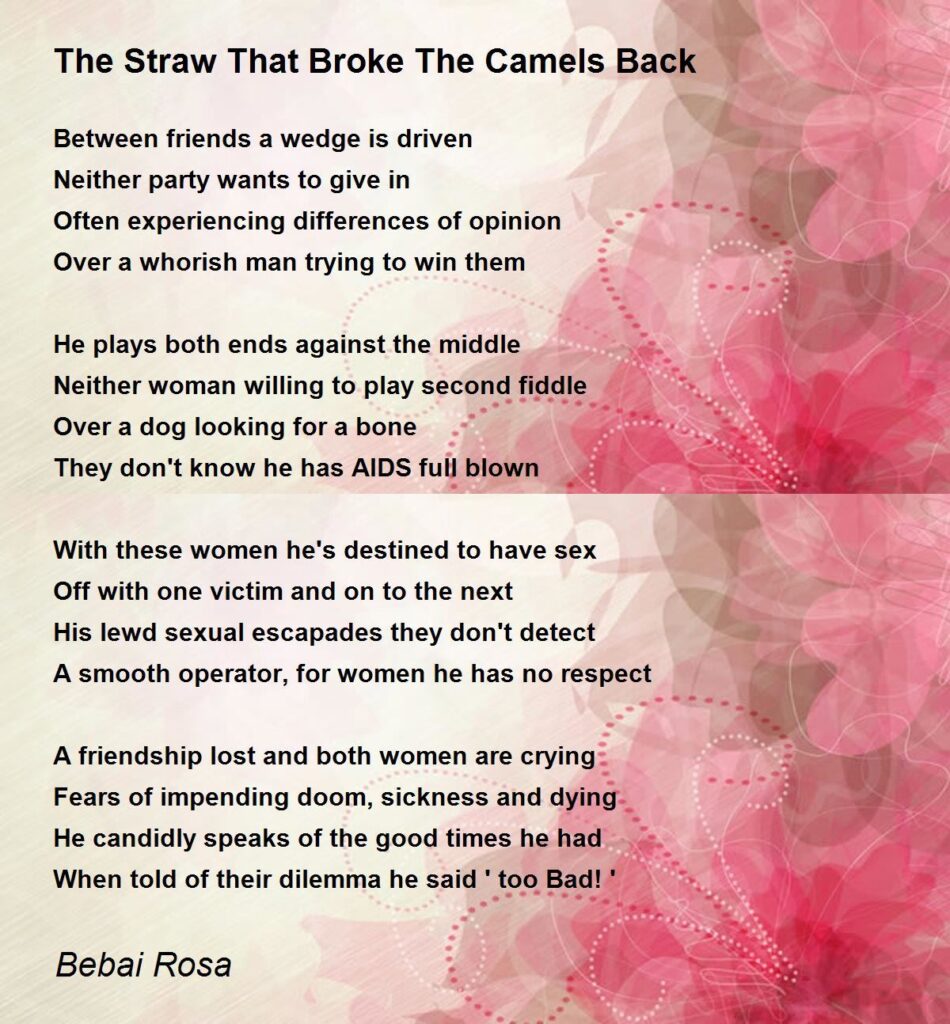
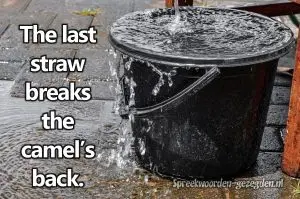
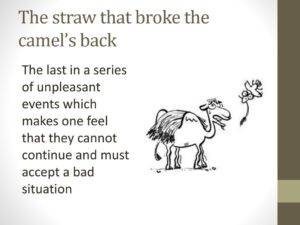
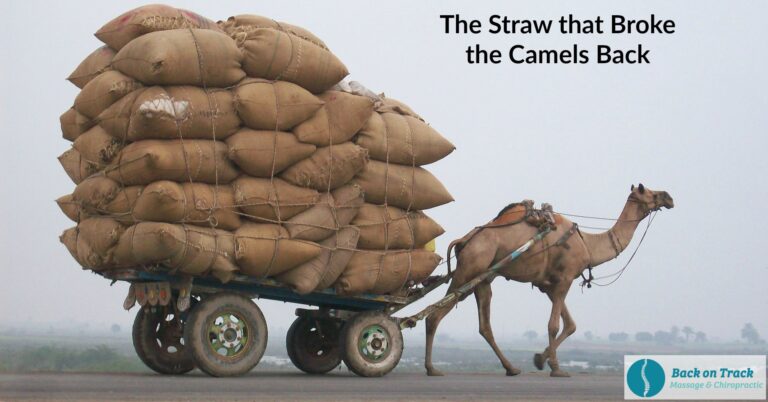
Origins and early uses
The earliest known version of the expression comes in a theological debate on causality by Thomas Hobbes and John Bramhall in 1654–1684:
The last Dictate of the Judgement, concerning the Good or Bad, that may follow on any Action, is not properly the whole Cause, but the last Part of it, and yet may be said to produce the Effect necessarily, in such Manner as the last Feather may be said to break a Horses Back, when there were so many laid on before as there want but that one to do it.
Oorsprong en vroeg gebruik
De vroegst bekende versie van de uitdrukking komt voor in een theologisch debat over causaliteit tussen Thomas Hobbes en John Bramhall in de periode 1654-1684:
Het laatste oordeel over het Goede of Slechte dat kan volgen op enige Actie, is niet strikt genomen de hele Oorzaak, maar het laatste Deel ervan, en kan toch gezegd worden het Effect noodzakelijkerwijs voort te brengen, op zo’n manier als het laatste Veertje gezegd kan worden de Rug van een Paard te breken, wanneer er zoveel op gelegd zijn dat er maar dat ene nodig is om het te doen.
1 ‘Post Office Scandal- The Tour’. BBC Breakfast – Nick Wallis and Tony Downey. Tour details below
2 “Can’t Believe This Is True” | Will Mellor Shares His Experience Of Playing Horizon Scandal Victim
8 jan 2024
The wrongful convictions of hundreds of subpostmasters due to faulty digital accounting software have been described as the most widespread miscarriage of justice in UK history.
The scandal has recently come back into the spotlight following ITV’s four-part drama Mr Bates vs The Post Office.
Actor Will Mellor tells Ian Collins what his reaction was when he first read the script.
“I started reading it and just kept putting it down and going, I can’t believe this is true.”
3 Instant Accomplice: Wife vs. Husband Charity Gifts Prank
22 sep. 2012